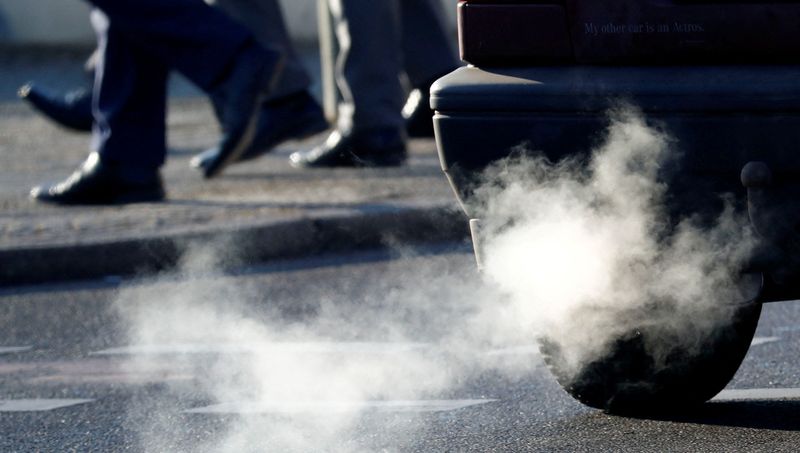Explainer-What are e-fuels, and can they help make cars CO2-free?
2023.03.22 04:55

© Reuters. FILE PHOTO: An exhaust pipe of a car is pictured on a street in a Berlin, Germany, February 22, 2018. REUTERS/Fabrizio Bensch/File Photo
By Victoria Waldersee and Kate Abnett
BERLIN/BRUSSELS (Reuters) – Germany has declared last-minute opposition to a landmark European Union law to end sales of CO2-emitting cars in 2035, demanding that sales be allowed of new cars with internal combustion engines after that date if they run on e-fuels.
The EU rules would require all new cars sold from 2035 to have zero CO2 emissions, making it effectively impossible to sell new fossil fuel-powered cars.
The law – which Germany, alongside a majority of EU countries and lawmakers, previously supported – would not ban internal combustion engines (ICEs).
But it is seen as a death knell for the technology because of a dearth of options that could enable ICE (NYSE:) cars to operate without producing CO2.
Here’s what you need to know.
WHAT ARE E-FUELS?
E-fuels, like e-kerosene, e-methane, or e-methanol, are made by synthesizing captured CO2 emissions and hydrogen produced using renewable or CO2-free electricity.
The fuels release CO2 into the atmosphere when used in an engine. But the idea is that those emissions are equal to the amount taken out of the atmosphere to produce the fuel – making it CO2-neutral overall.
Germany and Italy want clearer assurances from the EU that sales of new ICE cars can continue beyond 2035, if they run on CO2-neutral fuels.
WHO MAKES THEM?
Most major carmakers are betting on battery-electric vehicles – a technology that is already widely available – as the main route to cut CO2 emissions from passenger cars.
But suppliers and oil majors defend e-fuels, as well as a number of carmakers who don’t want their vehicles weighed down by heavy batteries.
E-fuels are not yet produced at scale. The world’s first commercial plant opened in Chile in 2021, backed by Porsche and aiming to produce 550 million litres per year. Other planned plants include Norway’s Norsk e-Fuel, due to begin producing in 2024 with a focus on aviation fuel.
CAN E-FUELS CLEAN UP CARS?
E-fuels can be used in today’s ICE vehicles and transported via existing fossil fuel logistics networks – good news for ICE component makers and companies which transport petrol and diesel.
Supporters say e-fuels offer a route to cut the CO2 emissions of our existing passenger car fleet, without replacing every vehicle with an electric one.
Critics highlight that manufacturing e-fuels is very expensive and energy-intensive. Using e-fuels in an ICE car requires about five times more renewable electricity than running a battery-electric vehicle, according to a 2021 paper in the Nature Climate Change journal.
Some policymakers also argue that e-fuels should be reserved for hard-to-decarbonise sectors such as shipping and aviation – which, unlike passenger cars, cannot easily run on electric batteries.
WHAT NEXT FOR THE EU LAW?
Days before the final vote on the EU law, which was scheduled for March 7, German Transport Minister Volker Wissing called into question Germany’s support for it.
That has put one of Europe’s core climate change policies on hold – and surprised other policymakers, because EU countries and lawmakers had already agreed the law last year.
Alongside Germany and Italy, countries including the Czech Republic and Poland have expressed concerns about the law, raising the possibility of enough support to block it.
But other EU lawmakers and diplomats warn that allowing one country to torpedo an already-agreed law would endanger other carefully negotiated deals on EU policies.
Free Democratic Party member Wissing said the use of e-fuels should remain possible after 2035, and a promised European Commission proposal on this was still missing.
In response, the European Commission has drafted a proposal, seen by Reuters, to allow carmakers to register new cars in the EU that can run on climate neutral e-fuels only. That could be a first step towards allowing their sale after 2035.
The draft proposal said vehicles must use technology that would prevent the car from starting if it used non-carbon-neutral fuels.
The International Council on Clean Transportation said it was doubtful technologies would be able to sense whether a vehicle is operating on pure e-fuels or a blend with fossil fuels – since e-fuels have very similar properties to the fossil fuels they are designed to replace.
An EU official told Reuters any new proposal would be made only after countries approve the combustion engine phaseout. Germany’s Transport Ministry said it was examining the draft proposal.
WHAT DO COMPANIES WANT?
Big auto component suppliers in Germany such as Bosch, ZF and Mahle are members of the eFuel Alliance, an industry lobby group, as are oil and gas majors from ExxonMobil (NYSE:) to Repsol (OTC:).
Carmakers such as Piech, Porsche and Mazda are broadly supportive of the technology. Porsche holds a stake in e-fuel producer HIF Global.
BMW has invested $12.5 million in e-fuel startup Prometheus Fuels, while also investing billions in battery-electric technology.
Other carmakers including Volkswagen (ETR:) and Mercedes-Benz are betting on battery-electric vehicles to decarbonise. Volvo and Ford this week urged EU countries not to row back on the 2035 phaseout of new petrol and diesel cars.








